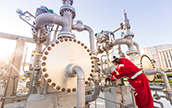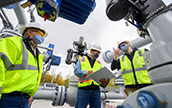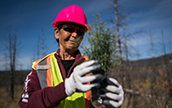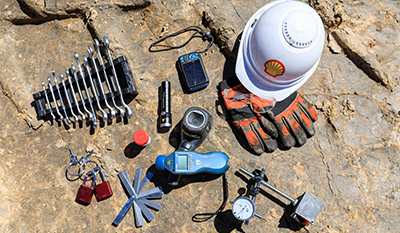Our approach to safety
Powering progress
Powering Progress is underpinned by our core values of honesty, integrity and respect for people and our focus on safety.
Safety is central to our Powering Progress strategy. We aim to do no harm to people and to have no leaks across our operations. We call this our Goal Zero ambition.
In 2021, we began to move from the Shell Life-Saving Rules, which were in place for more than a decade, to the International Association of Oil & Gas Producers (IOGP) Life-Saving Rules. This is an important step in our refreshed approach to safety. By the end of 2021, more than 100,000 of our employees and contractors had completed the mandatory training on the new Life-Saving Rules. The new rules came into effect from January 2022.
Read more about our approach to safety at www.shell.com/sustainability/safety/our-approach.
Personal safety
The number of safety incidents increased in 2021, after steady improvements in reducing these over the last few years.
Eight of our contractor colleagues lost their lives in the course of their work on Shell-operated venture activities in 2021. We feel these losses deeply. We are determined to learn from these incidents and spread the lessons from them throughout our organisation so we can help prevent anything similar recurring.
Six people working for a contractor were killed when gunmen attacked a convoy of buses travelling to the Assa North Gas development project site in Nigeria. A government security agent was also killed in the incident and seven other people were injured. Shell Petroleum Development Company of Nigeria Limited (SPDC), in its capacity as operator of the SPDC joint venture (Shell interest 30%), supported the contractor during the emergency response and the investigation of the incident.
In Pakistan a contractor died at a service station operated as a franchise after a flash fire that occurred when a product was being delivered to the site. Two other people were injured in the fire.
In Indonesia, a contractor died after being injured when a wall collapsed during demolition work at a service station. Three other people were also injured.
At Shell, we work closely with our contractors to help build a strong safety culture at the frontline.
Read about how we work with our contractors at www.shell.com/sustainability/safety/our-approach.
Fatal accident rate (FAR)
Fatal accident rate (FAR)
Number per 100 million hours
Our fatal accident rate – the number of fatalities per 100 million working hours in our operated ventures – increased to 1.7 in 2021 compared with zero in 2020.
Serious injuries and fatalities frequency (SIF-F)
To strengthen our efforts to protect people from harm, we now measure the number of serious injuries and fatalities per 100 million working hours. This allows us to focus our efforts to prevent serious injuries and fatalities on the most critical events. In 2021, the number of serious injuries and fatalities per 100 million working hours (SIF-F) was 6.9, compared with 6.0 in 2020.
Total recordable case frequency (TRCF)
Total recordable case frequency (TRCF)
Number per million hours
In 2021, the number of injuries per million working hours – the total recordable case frequency (TRCF) – was 0.9, compared with 0.7 in 2020.
Shell’s response to COVID-19
In 2021, COVID-19 restrictions meant that many staff members were working from home, fewer people were able to travel on Shell business and many of our work activities, including higher-risk ones, were reduced or carried out differently. Sadly, one contractor died in 2021 after catching the virus in the course of working for Shell. In 2020, two contractors died after they caught COVID-19 at work.
We continued to support our people during COVID-19, for example by providing office equipment for home use for employees through our Home Ergonomics Programme.
The COVID-19 pandemic continues to have a serious impact on people’s health and livelihoods in most parts of the world, including communities where we work. We continued to support vulnerable groups and frontline workers through monetary donations and by providing medical supplies and other necessities.
Read more about Shell’s response to COVID-19 at www.shell.com/covid19.
Lost time injury frequency (LTIF)
Lost time injury frequency (LTIF)
Number per million hours
The level of injuries that led to time off work in 2021 increased to 0.3 cases per million hours compared with 0.2 in 2020.
Read more about our approach to personal safety at www.shell.com/sustainability/safety/personal-safety.
Read more about how Shell’s 2021 safety performance impacted remuneration in the Directors’ Remuneration Report in our Annual Report.









